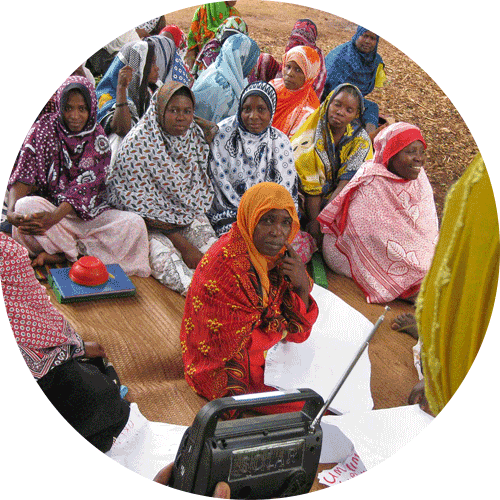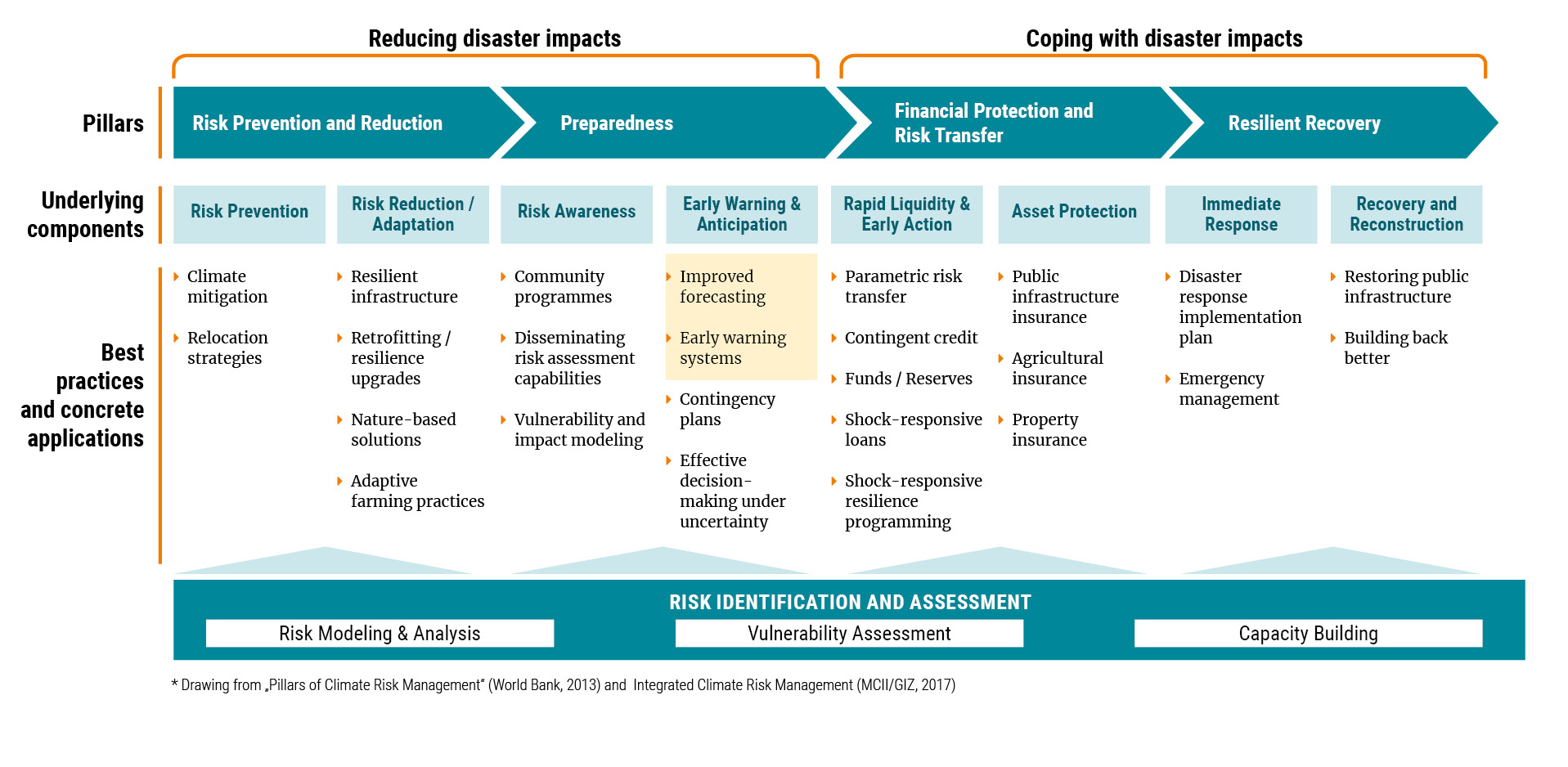Workstream 2: Action & Implementation
Enable effective action and implementation of high-quality Climate and Disaster Risk Finance and Insurance solutions in poor and vulnerable countries
CREWS Initiative
Climate Risk and Early Warning Systems Initiative - Facing drought risk in Burkina Faso with better risk warning and anticipation
By the CREWS Initiative
In Least Developed Countries and Small Island Developing States, farmers face many challenges in producing successful crops. Changing climates in agricultural zones around the globe are now bringing even more challenges. To help address these challenges in Burkina Faso, funding from the Climate Risk and Early Warning Systems (CREWS) Initiative supports the strengthening of national capacities for early warning service delivery with a multi-hazard approach.
Since January 2017, the CREWS project in Burkina Faso has helped 100,000 small-scale rural farmers in Burkina Faso to access advanced agrometeorological advisories. The objective is to adjust their farming practices in order to optimize field cropping calendars. More than one million people across Burkina Faso’s northern region are now benefiting directly and indirectly from the initiative, improving their lives and livelihoods. Key partners in this initiative include the Burkina Faso National Meteorological Service, the World Bank and the World Meteorological Organization (WMO).
The InsuResilience Global Partnership and CREWS Initiative are closely interlinked. Both were launched in 2015 (the InsuResilience G7 initiative at the G7 Summit in Elmau, CREWS at COP21 in Paris, France) as part of the climate action agenda, contributing to resilience, and more specifically to protecting lives and livelihoods. Both advocate for preparedness, improved forecasting and informed decision-making, as demonstrated in this project and other project work. CREWS supports risk reduction and preparedness through a focus on early warning systems, while InsuResilience supports financial protection through a focus on climate and disaster risk-finance and insurance solutions within a framework of comprehensive risk management. Both are based on a core set of enhanced risk knowledge and contribute to risk management.
Feedback from farmers in the pilot communities has been overwhelmingly positive:

“Information was provided on the planting dates of legumes. We followed this advice and we had a good harvest. Those who did not listen to this advice saw their cowpeas destroyed by the last rains.”
Farmer in Burkina Faso
Country Background
Burkina Faso is a landlocked country in West Africa, with an estimated 45% of its approximately 18 million inhabitants living on less than USD 1.25 per day. With limited natural resources, the economy is mostly dependent on rainfed agricultural production, including fishery, livestock-raising and agroforestry.
Burkina Faso has three climatic zones characterized by a short rainy season and a long dry season. The major risks the country faces are related to climate variability and change, including droughts, flooding, crop pest invasions, winds, dust storms, heatwaves and seasonal epidemics.
Between 1991 and 2020, Burkina Faso has experienced 15 major floods which have affected about 670,000 people and claimed 185 lives, nine major droughts which have affected nearly 12.5 million people and 22 episodes of epidemic diseases.
For low-income farmers, having seeds washed away by unusually heavy rains or dried-off by drought is devastating and can result in the loss of annual income and low food supply for their families. Planting too early or too late can result in poorer quality and quantity of crops, therefore generating less income.
Project description
Access to advanced weather information is critical to successful agricultural production in Burkina Faso – and to ensure the protection of lives and livelihoods.
In Burkina Faso, the CREWS project supports the provision of advanced weather advisories to small-scale rural farmers at three pilot sites. Weather bulletins are included daily as part of the regular local radio broadcast, and specific advice for farmers is provided every 10 days.
The initiative started with an assessment of the capacities of early warning systems and user requirements in Burkina Faso, and developed into further support tailored to the circumstances. The project provided technical support to improve weather monitoring and forecasting. At the same time, both technical and financial resources were provided to the National Meteorological and Hydrological Services to enhance the delivery of weather and flood advisory services to farmers.
These early warning advisory services are customized for three pilot areas. Direct training was given to more than 1,100 farmers to support them in understanding how to adjust their farming practices. This aims at optimizing yields in relation to cropping calendars specific to each pilot zone. Local radio operators were trained on how the community members access, process and respond to information and warnings. This has better enabled community members to integrate observed rainfall and remote sensing estimates, local information about crop water requirements and forecasts into their decision-making when farming. Three local radio operators have provided specific advisories in local languages both on a daily and ten-day basis.
This plays a powerful role in the risk-reduction value chain as the availability of solid data is key. This project contributes to the overall climate risk reduction for farmers in Burkina Faso, in accordance with the objectives of CREWS and the InsuResilience Global Partnership.

Feedback from farmers in the pilot communities has been overwhelmingly positive:
“The trainings and weather advisories have been very useful because people no longer seed randomly, they wait for a useful amount of rain before sowing.”
Farmer in Burkina Faso

Covid-19 impact and response
In light of Covid-19, inter-city travel and face-to face meetings and training sessions were initially banned in Burkina Faso, but they have been allowed again since early June 2020. Teams from the National Meteorological Service (ANAM) have continued to support the pilot sites and deliver training and advisories to farmers, extension agents and local radio operators.
Three problems remain. First, access to Burkina Faso for international experts remains difficult.
Many international experts are not allowed to travel and experts from the sub-region need to provide proof of negative Covid-19 tests when they travel back from Burkina Faso to most countries in the region.
Secondly, the low Internet bandwidth available in Burkina Faso is not adequate for carrying out virtual training sessions and project backstopping activities, which has caused training cancellations. Thirdly, the Covid-19 crisis has led to reduced control by authorities and the international community in large parts of the territory in the north of the country, possibly leading to a recrudescence of terrorist activities and food insecurity.
One positive development in relation to Covid-19, despite the negative impacts mentioned above, is that experts in Burkina Faso rely more on national institutions to carry out their work and this has boosted knowledge transfer.
Burkina Faso project mid-term review video

By loading the video, you agree to YouTube's privacy policy.
Learn more
Summary Table
Overview | |
|---|---|
Risk(s) to be covered | Drought, sand and dust storm, flash flooding, weather extremes |
Product/Solution | Meteorological and hydrological forecasting, advisory and warning services (CREWS) to cover hazards including sand and dust storms, flash flooding and extreme weather events |
Objective | Building the capacity of the National Meteorological and Hydrological Services and strengthening its cooperation with key sectoral ministries, departments and other stakeholders working to deliver warnings and relevant information to end users. |
Beneficiaries | 1,100+ individual farmers in three pilot communities were trained in how to interpret and act on the advanced climate, hydrological and weather advisories.
1,000,000+ people across Burkina Faso are now benefiting directly and indirectly from the initiative, improving their lives and livelihoods.
80% of Burkina Faso’s 20 million people are employed in the agricultural sector and would be supported by expanded access to early warning systems under the World Bank Burkina Faso Hydromet Project (USD 33 million).
|
InsuResilience Global Partnership Members and their partner organizations/governments | Burkina Faso National Meteorological, Hydrological, Agricultural and Civil Protection Services, World Bank, WMO |
Climate and Disaster Risk Management
Placement of this project along the climate and disaster risk continuum:

